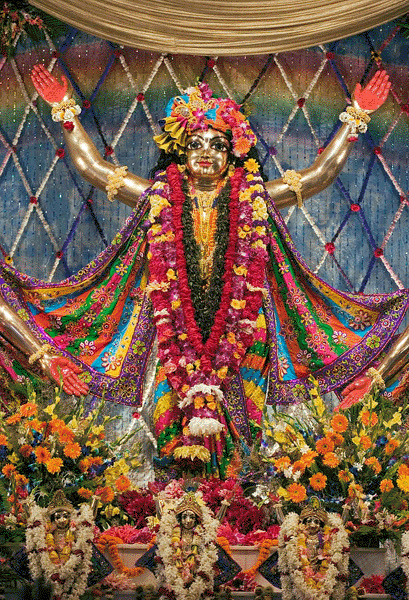
It is once again time for a guided meditation on the ripened fruit of the tree of
Vedic knowledge, the
Srimad-Bhagavatam.
I humbly ask you to read first the translation and
Bhaktivedanta purport to today's verse, the
18th verse from the Third Chapter of the Second Cantotaravaḥ kiḿ na jīvanti
bhastrāḥ kiḿ na śvasanty uta
na khādanti na mehanti
kiḿ grāme paśavo 'pare
Do the trees not live? Do the bellows of the blacksmith not breathe? All around us, do the beasts not eat and discharge semen?
Prabhupada sums up the whole darn situation pretty straight when he writes in the purport that "The modern man wants to live forever by the advancement of material science, and there are many foolish theories for prolonging life to the maximum duration. But the Śrīmad-Bhāgavatam affirms that life is not meant for so-called economic development or advancement of materialistic science for the hedonistic philosophy of eating, mating, drinking and merrymaking. Life is solely meant for tapasya, for purifying existence so that one may enter into eternal life just after the end of the human form of life."
This pushing forward of tapasya at the expense of personal enjoyment is one of the foundations of the revolution in consciousness that we are trying to spread via the teachings of the parampara, and it is one of the most difficult aspects. After all, we know from our own personal experience, via our cultural upbringing, especially in the West, that we aren't exactly chomping at the bit to give up all we find comfortable, pleasurable, and soothing.
Prabhupada was keenly aware of this. He knew because of the various sundry influences of the age of Kali, we were not meant for the traditional forms of tapasya like sitting and fasting and controlling the breath in the examples of Parkisit Maharaja and Dhruva Maharaja.
In the purport to SB 10:3:34-35, Prabhupada writes "human life is meant not for becoming a hog or dog, but for tapo divyam [SB 5.5.1], transcendental austerity. Everyone should be taught to undergo austerity, tapasya. Although it may not be possible to undergo tapasya like that of Påçni and Sutapä, the sästra has given an opportunity for a method of tapasya very easy to perform—the sankirtan movement.....yet simply by chanting the Hare Krsna mahä-mantra (kirtanäd eva krsnasya [SB 12.3.51]), one can become so pure that one becomes free from all the contamination of this material world (mukta-saìgaù) and goes back home, back to Godhead (paraà vrajet). "
So, there's no doubt about it. We can't avoid austerity, we have to give up material sense enjoyment, but this seemingly impossible process is made easy simply by chanting, with all sincerity, the Hare Krsna maha-mantra. This is the mercy of the panca-tattva.
HG Balarama Chandra Prabhu spoke nicely in relation to this in his Bhagavatam class this morning. One point he made was that when we think of establishing varnasrama, there is a tendency among devotees (myself included) to think of farm life, cow protection, and the like.
These aspects are certainly essential to Prabhupada's vision of varnasrama, but we must not forget or ignore the actual developing of the varnas, or the development of brahminical consciousness, as being the most important aspect. We can't begin to develop self-sufficient lifestyles in our communities without the proper consciousness preceding it.
This summer, I remember being told that one devotee who was visiting had been helping in some harvesting in our Garden of Seven Gates here at New Vrindaban, and at one point he suddenly got very fed up and stopped, saying that he wasn't there to do "slave work." I was very much taken aback by his strong, negative response to some very needful service. I understand more now that his consciousness was not in the right place to understand and appreciate the austerity of the service he was performing.
For anyone who harvests crops, and for anyone who's not used to harvesting crops, it is austere work. As we really don't like in this age to have to undergo austerities, unless we have developed a strong consciousness as to why we should perform services that are difficult for us, we will think of it simply as "slave work."
Chanting the maha-mantra is our main austerity, and as we develop an appreciation and real taste for the Holy Name, then we will not find other austerities so difficult.
I also like Prabhupada's image of the "polished animal" or "persons who are simply engaged in planning a better type of animal life consisting of eating, breathing and mating". These "polished animals cannot benefit suffering humanity, for an animal can easily harm another animal but rarely do good."
By doing all we can to get out onto the streets and spread the resounding sound of the Holy Name, we can provide the actual benefit, the highest benefit. We can strip away the polish, break down the animal instincts, and let the light of the soul we shine through. When we actually experience that bliss, how can anything in Krsna consciousness be considered an austerity?
 Boys will be boys on Saturday night on 1st Ave in Manhattan. I mean, what else is there to do besides chant the Holy Name at the top of your lungs. The brahmacaris from the Bhaktivedanta Ashram in Manhattan and from New Vrindaban in the holy hills of west Virginia certainly can't think of any better to do. The proof is in the pudding!
Boys will be boys on Saturday night on 1st Ave in Manhattan. I mean, what else is there to do besides chant the Holy Name at the top of your lungs. The brahmacaris from the Bhaktivedanta Ashram in Manhattan and from New Vrindaban in the holy hills of west Virginia certainly can't think of any better to do. The proof is in the pudding!



